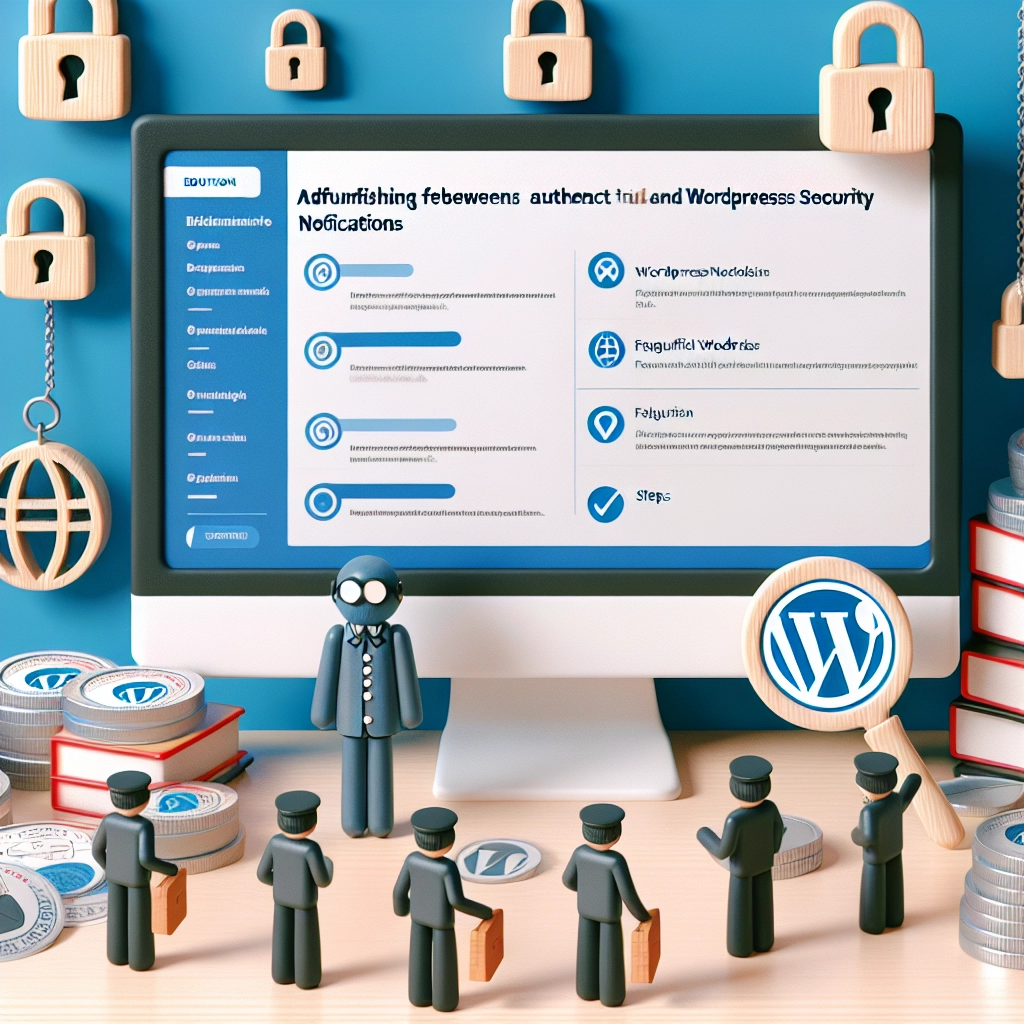Imagine checking your inbox and finding an urgent email that seems to come from the ‘WordPress Security Team.’ The message warns you of a serious vulnerability on your site, urging immediate action. Panic sets in—you fear for your website, which could mean losing customers and revenue. However, this email might not be real; it could be a scam designed to trick you.
Increasingly, fake security emails target WordPress users, preying on their anxiety about online security. Many have fallen victim to these scams, leading to the accidental compromise of their websites. This guide will help you distinguish between genuine and fake WordPress security emails, empower you with knowledge on spotting red flags, and guide you on what to do if you receive a suspicious message.
Understanding Fake WordPress Security Emails
Scammers recognize that website owners are concerned about security. Therefore, they craft messages that appear official, often impersonating your hosting provider or a security firm. Typical features of these emails might include:
- Claims of a vulnerability on your site.
- References to security vulnerabilities with formal names.
- Immediate requests to take action, like clicking suspicious links or downloading patches.
The twist? These links often direct you to phishing sites that mimic legitimate ones or may prompt you to install malware-laden plugins.
Identifying Red Flags
Identifying a fake WordPress security email can be tricky, especially as the scammers improve their tactics. Below are common signs of such scams:
- Suspicious Sender Address: Official WordPress emails come from
@wordpress.org. Any deviation is a potential red flag. - Urgent Calls to Action: Warnings that insist on immediate action are designed to provoke panic.
- Lack of Professionalism: Many scams feature poor grammar or inconsistent branding, making them stand out from genuine emails.
- Misleading Links: Hover over links to check their destination. If it doesn’t lead to a recognized WordPress site, do not click it.
- Unexpected Attachments: Most security notifications will not include attachments; if they do, it’s a likely scam.
- Requests for Sensitive Information: Legitimate sources will never ask for passwords via email.
Recognizing these signs is crucial. One reported incident involved a user who clicked on a malicious link from a fake email, compromising their site within hours.
Verifying the Legitimacy of Suspicious Emails
If you receive a concerning email, these verification steps can help you discern its authenticity:
-
Check Official WordPress Sources: Look for security notices on the official WordPress site. If an urgent vulnerability is mentioned, verify it there.
-
Examine Sender Information: Ensure the email originated from the official WordPress domain.
-
Compare with Previous Emails: Look at prior legitimate emails; scammers often fail to mimic the tone and structure accurately.
-
Check Your Hosting Provider: Many reputable providers will post security updates. If they haven’t announced the issue, the email is likely fake.
-
Inspect Links Without Clicking: Always hover over links to see their destinations before clicking.
-
Utilize Security Plugins: Tools like Wordfence or Sucuri can alert you to actual vulnerabilities, giving you a reliable comparative measure against potentially false claims.
What to Do If You Suspect a Scam
If you’ve identified a fake security email, avoid acting impulsively. Here are the steps to take:
-
Avoid Clicking Any Links: Even if it seems legitimate, do not engage with links or attachments.
-
Monitor Your Site: Log into your WordPress dashboard to check for unfamiliar users or recent, unrecognized changes.
-
Report the Email: Notify your hosting provider about the suspicious message; they may have protocols in place.
-
Mark It as Spam: Report the email as spam or phishing to help filter these types of communications in the future.
-
Run a Security Scan: Use a security plugin to check for malware or any unauthorized changes.
If You’ve Already Engaged with the Scam
If you’ve mistakenly clicked a link or provided sensitive information, act quickly:
-
Change Your Passwords: Secure WordPress, hosting, and any affected accounts immediately.
-
Remove Unknown Users: Check for unauthorized accounts in your WordPress dashboard and delete them.
-
Scan for Malware: Utilize security plugins to identify harmful changes or scripts on your site.
-
Restore from Backups: If necessary, revert any changes by restoring your site from a clean backup.
-
Check Your Files: Use your hosting provider’s control panel to inspect the file system for suspicious files.
-
Update Software Regularly: Make sure your WordPress version and all plugins are up to date to mitigate risks from known vulnerabilities.
Preventive Measures
Safeguarding your website from future scams involves a proactive approach:
-
Implement Two-Factor Authentication: Adding a second layer of security to your login process can help thwart unauthorized access.
-
Utilize Security Plugins: Regular use of WordPress firewall and security plugins can provide additional protective measures.
-
Maintain Regular Updates: Keeping your WordPress installation and plugins updated can prevent exploitation of known flaws.
-
Verify Security Emails: Always check credible sources before taking action based on urgent emails.
-
Educate Your Team: Ensure that everyone contributing to the site knows how to identify phishing tactics and report suspicious incidents.
By being proactive and vigilant, you can significantly reduce your risk of falling victim to these scams. Next time you receive an unexpected email about your site’s security, remember to stay calm, verify, and approach the matter methodically. Protecting your WordPress site doesn’t just involve technical measures but also a mindset of caution and awareness.
Welcome to DediRock, your trusted partner in high-performance hosting solutions. At DediRock, we specialize in providing dedicated servers, VPS hosting, and cloud services tailored to meet the unique needs of businesses and individuals alike. Our mission is to deliver reliable, scalable, and secure hosting solutions that empower our clients to achieve their digital goals. With a commitment to exceptional customer support, cutting-edge technology, and robust infrastructure, DediRock stands out as a leader in the hosting industry. Join us and experience the difference that dedicated service and unwavering reliability can make for your online presence. Launch our website.

